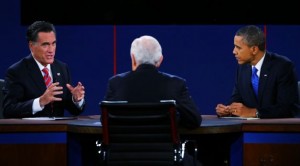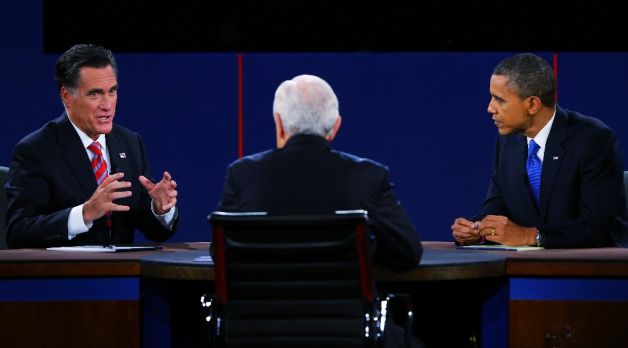 In the wake of President Obama’s decisive election victory, we’ve seen a fair amount of commentary about how it demonstrates the powerlessness, or spinelessness, of the anti-war left. Some of this commentary (like this piece by Jason Brennan) comes from libertarians and anti-interventionists who are genuinely concerned about Obama’s record on civil liberties and national security. Much of the commentary, however, is clearly “concern trolling” — it comes from people who are seeking primarily to vindicate the Bush administration’s prosecution of the war on terror by suggesting that Obama has adopted it wholesale. (Jim Lakely’s piece from today is one example.) Regardless, the general outlines of the argument are clear: by (for the most part) falling in line behind Obama’s reelection, despite policies like his expansion of the drone war and his failure to close Guantanamo, those who criticized Bush’s foreign policy have demonstrated the basic hypocrisy of their position.
In the wake of President Obama’s decisive election victory, we’ve seen a fair amount of commentary about how it demonstrates the powerlessness, or spinelessness, of the anti-war left. Some of this commentary (like this piece by Jason Brennan) comes from libertarians and anti-interventionists who are genuinely concerned about Obama’s record on civil liberties and national security. Much of the commentary, however, is clearly “concern trolling” — it comes from people who are seeking primarily to vindicate the Bush administration’s prosecution of the war on terror by suggesting that Obama has adopted it wholesale. (Jim Lakely’s piece from today is one example.) Regardless, the general outlines of the argument are clear: by (for the most part) falling in line behind Obama’s reelection, despite policies like his expansion of the drone war and his failure to close Guantanamo, those who criticized Bush’s foreign policy have demonstrated the basic hypocrisy of their position.
The argument has both important elements of truth and notable overstatements. As I’ve written before, it has been genuinely dismaying to see the lack of concern about the drone war among most liberal commentators, and the failure to hold Obama’s feet to the fire on drone strikes (and the administration’s policy of assassinations more generally) has been striking and frequently shameful. On the other hand, while Obama’s record on civil liberties is certainly nothing to be proud of, the notion that he has been “no different from Bush” is exaggerated. On some issues, like banning waterboarding, he has reversed Bush administration policies. On others, like the failure to close Guantanamo, his maintenance of the status quo has stemmed more from demagogic opposition from congressional Republicans than from a desire to continue current policies. (Many of the people who now cite Obama’s failure to close Guantanamo as vindication of Bush’s policies are the same ones who screamed bloody murder about terrorists running loose on American soil when Obama initially attempted to close the prison.)
But in assessing the support for Obama’s reelection among what has been clumsily labeled the “antiwar left,” the real question we should consider is what alternatives were on offer. (I find the term “antiwar left” unhelpful because it runs together several distinct groups united only by their distaste for Bush’s foreign policy — genuine leftists who never really supported Obama, liberals who did, paleoconservatives who increasingly came to.) One could always vote for Jill Stein or another third-party protest candidate, or not vote at all. But if one accepted that either Obama or Romney was going to win, and decided to choose the candidate most aligned with antiwar principles, who would it be?
The charge of hypocrisy would stick better if Romney had run on a platform criticizing Obama’s conduct of the drone war, or his record on civil liberties. Notably, however, Romney chose not to do so. The level of agreement between the two candidates during the final debate in Boca Raton was one sign of Romney’s decision not to attack Obama from the left on foreign policy. On Afghanistan, his campaign vacillated between vague criticisms without ever offering a coherent critique of Obama. On the issues of torture and civil liberties, Romney made clear that he would be far more authoritarian than even Obama — for instance, his famous pledge to “double Guantanamo” during the 2008 campaign, or his advisors’ call to rescind Obama’s executive order banning torture.
The main issue where Romney differentiated himself from Obama on foreign policy was the Middle East, where Romney pledged to basically outsource US foreign policy to Benjamin Netanyahu and take a far more hawkish line against Iran. To what extent he would have followed through on this will remain a mystery. One plausible line of argument suggested that his Iran rhetoric was mostly bluster, and that in office he would follow the more realist line of a Robert Zoellick rather than the bellicosity of a John Bolton. Still, it’s easy to understand why few anti-interventionists would want to invest all their hopes in the possibility that Romney might be lying about his hawkish intentions.
So what was the “antiwar left” to do? Romney basically endorsed every Obama policy that they found troubling, distinguishing himself only by being more openly contemptuous of civil liberties for alleged terrorists and more publicly eager to start a war with Iran. In these circumstances, the left’s support of Obama could be read as hypocrisy — or it could be read as a perfectly defensible willingness to hold one’s nose and vote for the lesser evil.






Daniel’s comments are perceptive and summarize the dilemmas that confronted the left during the election. But few caveats are in
order.
1 – Even Contemplating that Romney would take a position to the left of Obama on foreign policy is an exercise in futility.
Both candidate operate in the framework of American exceptionalism – read jingoism.
2 – The issue is never whether one should have voted for Obama or not. It was, “what do you get in return”? Nothing. In effect,
Obama’s camp said” hey lefties, you have no option other than voting for us or staying home, good luck.” The example of tea
party. They brought votes for Republicans in 2010 and got rewarded by presenting their own candidates under the Republican banner.
3 – Dr. Stein’s campaign was ineffective. In the last few days of campaign people started to receive e-mails from her
organization. You know what they were asking for: money! They were not asking for votes but for money and that in two days before
the election! Where were you for all those months?
What is the solution: organize, organize, organize. If you do so, your compromises if you have to have them will be be meaningful,
since you get something in return. That is the lesson to be learned from debacle of OWS and all the movements in the
last couple of 100 years. you have to be organized to make a difference.
What should be a platform for foreign policy for a leftist organization? Combat nationalism, militarism and inteventionism.
Get to the roots of American exceptionalism. Show fallacies underlying the American foreign policy debates. (See e.g. Leslie Gelb’s column in
recent issue in FP about Cuban missile crisis for compromises JFK had to make.) Teach people about universal declaration
of human rights on top of bill of rights. Tell them that stress in diversity and respect for the “other”in the country
(good thing) is irreconcilable with killing people abroad who have the same skin color and speak the same language of those who you want to respect at home by troves. It is reprehensible.
Stop perpetuating the Obama GITMO myth…
http://www.salon.com/2012/07/23/the_obama_gitmo_myth/